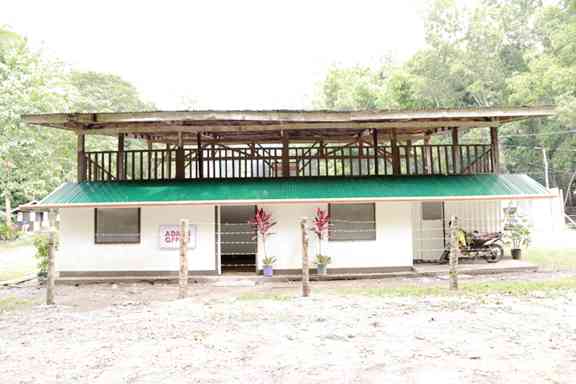Duterte idea takes shape: Rehab center rises in Army camp

THE ADMINISTRATION building of Agusan del Sur’s rehabilitation center for drug users rises inside the camp of the Army’s 401st Infantry Brigade in Prosperidad town. CONTRIBUTED PHOTO
PROSPERIDAD, Agusan del Sur—The provincial government yesterday opened a drug rehabilitation center inside the camp of the Army’s 401st Brigade in the village of Awa here, the first such facility inside a military camp following statements made by President Duterte that military camps would be ideal sites for treating drug addicts.
Gov. Adolph Edward Plaza led the inauguration of the Agusan del Sur Residential Treatment and Rehabilitation Center (RTRC) inside the headquarters of the 401st Infantry Brigade. It has facilities that can accommodate up to 60 drug users.
Santiago Cane Jr., provincial board member, said the RTRC is part of three components of a program by the provincial government to rehabilitate drug users called Substance Use Recovery and Enlightenment (Sure).
Cane, author of the ordinance that gave birth to Sure, said the rehab center would have a dormitory, administration building, toilets and bathrooms, mess hall, kitchen, workers’ sleeping quarter, a reception area, tennis cum basketball court, a hut, counseling room, inspection area and clinic.
Cane said the Army camp, where the rehab center is located, has been offered by Mr. Duterte for government agencies and local government units to use to address the growing number of drug addicts who yielded to police nationwide.
Article continues after this advertisementOther components
Article continues after this advertisementAccording to Cane, the two other components of the provincial government’s all-out campaign against drugs is an outpatient program that is already offering medical services to patients with moderate addiction and an information campaign being carried out in schools on the evils of drug use.
Sure, according to the provincial government, is a pet program of the governor. Plaza had tapped Mark Larry Chua, an international addiction therapist and consultant of the US Bureau of International Narcotics and Law Enforcement Affairs, to be the program director.
Temporary facility
Cane said the RTRC is meant for patients with severe cases of drug abuse. This early, 30 persons had already expressed interest in enrolling in the program and being admitted to the facility.
The RTRC, however, would only be a temporary facility until the provincial government had finished a permanent structure to house a rehabilitation center.
The RTRC will complement the already congested Regional Drug Rehabilitation Center in Surigao City operated by the Department of Health.
Cane said relapse patients, however, can no longer avail themselves of the free services and would have to finance half of the cost during their six-month stay in the RTRC to defray salaries for psychologists, psychiatrists, physical therapists, nurses and other workers.
“I consider this as my second life,” said a man in his 40s, who volunteered admission to the drug rehab program of the provincial government. Chris V. Panganiban, Inquirer Mindanao